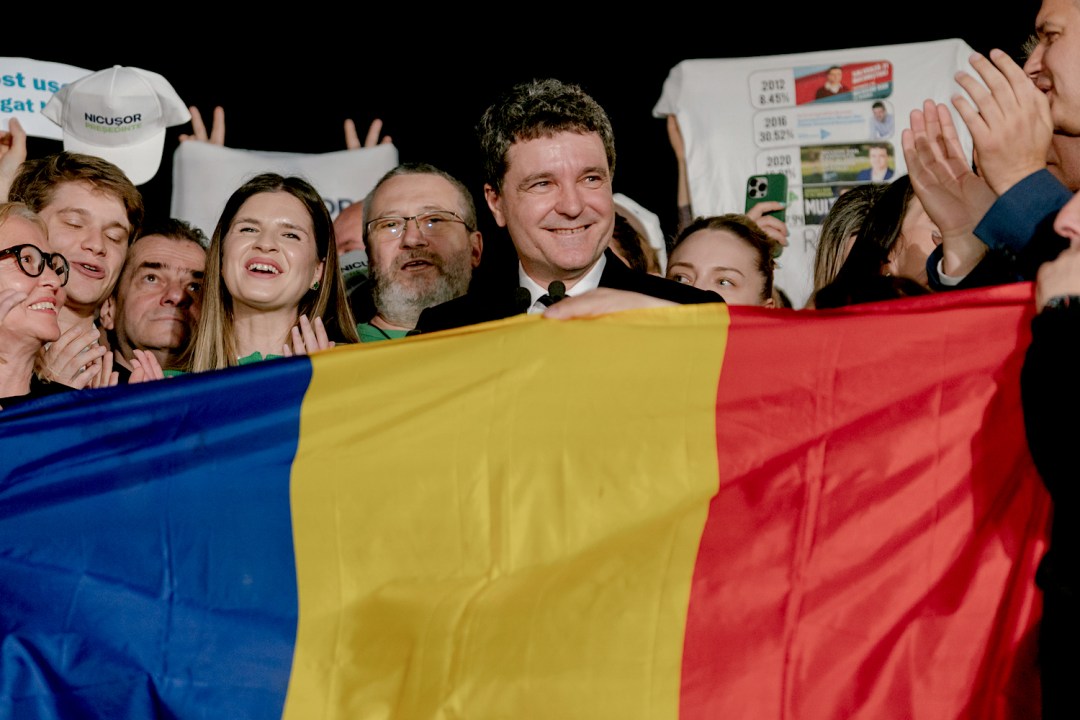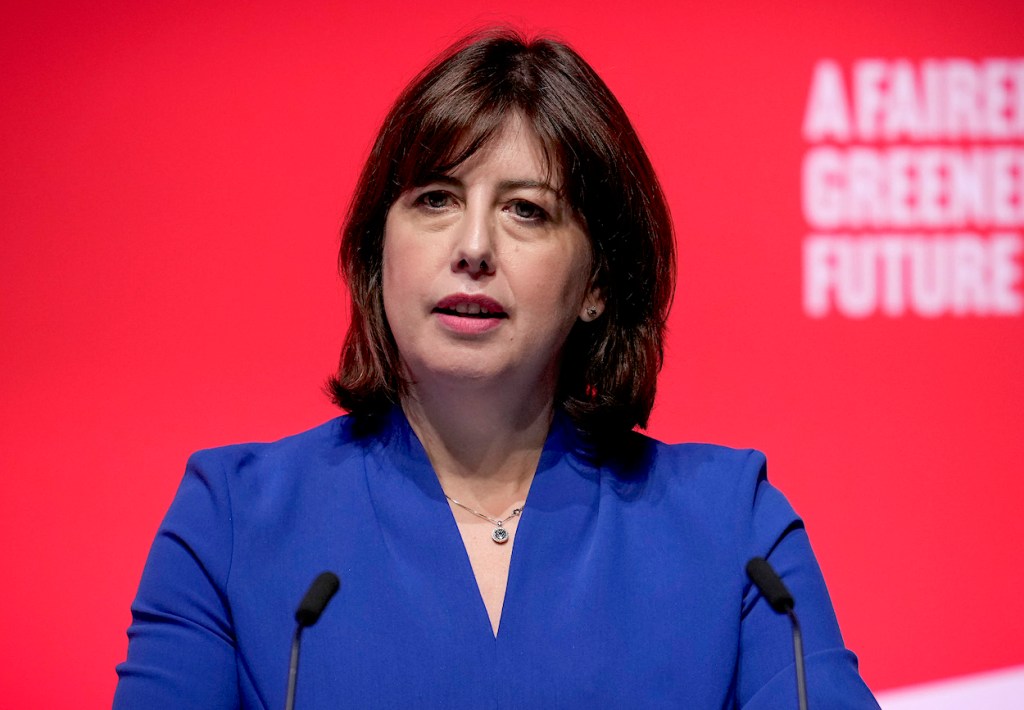Bucharest, Romania
Moments before Romania’s exit poll was announced, George Simion, the nationalist firebrand and presidential hopeful, was tapping his feet to YMCA on the steps of parliament. The campy American anthem bounced off the marble facade of Nicolae Ceausescu’s vast neoclassical palace, an incongruous soundtrack for the night’s unfolding drama.
Behind him, a phalanx of aides, friendly broadcasters and visiting politicians, some in MAGA hats, swayed to the beat. Then came the news: Simion was on track to lose.
He didn’t miss a step. Taking the lectern, he thundered that he had, in fact, won by 400,000 votes. His supporters cheered. Cameras snapped. It wasn’t entirely clear whether he believed it himself.
Across town, his opponent, Nicusor Dan, looked no less assured. The soft-spoken mathematician and Europhile waved to a jubilant crowd from the balcony of his campaign headquarters. Both men, evidently, felt the night belonged to them.
Simion’s right wing AUR party had long dismissed the country’s mainstream polls, preferring its own bullish forecasts. After the speech, he returned to his office in parliament, trailed through dim corridors by loyalists and secret service agents. On the way, he posted on X: ‘I am the New President of,’ followed by the flag of Chad, nearly identical to Romania’s.
This was no ordinary election with the usual carousel of centrist technocrats and tired coalitions. It was the most consequential vote since the fall of communism in 1989: a referendum, in all but name, on Romania’s place in the world.
Dan promised stability, closer ties with Brussels and Nato, and continued support for Ukraine. Simion offered something else. A former football ultra turned MP, he positioned himself as a bulwark of Christian Europe, national sovereignty and common sense: a Romanian Trump, with Orthodox trimmings. He railed against gender ideology, EU censorship and the West’s moral decay. He pledged to scale back support for Kyiv and revisit the romantic idea that Moldova might prefer reabsorption.
His rise began in November, after Romania’s previous election was annulled. Calin Georgescu, a right-wing populist, had won the first round, propelled by a slick TikTok campaign that pilloried Nato and the EU. A former UN official with a fondness for Putin and the country’s 1930s fascist legionnaires, Georgescu unnerved the political establishment. The ruling coalition refused to accept the result.
Brussels exhaled. Romania shares the EU’s longest border with Ukraine, and Nato is preparing its largest base on the continent there. A nationalist government in Bucharest, then, was not merely an inconvenience but a potential rupture in Europe’s eastern flank.
Still, annulling an election raised eyebrows across the continent, and, with Trump’s return, across the Atlantic too. JD Vance cited it in Munich as proof of Europe’s democratic drift. Simion was blunter: he called it a ‘coup d’état’, and said the instigators should be ‘skinned alive in the public square.’ He promised to appoint Georgescu as prime minister if he won.
Central Bucharest erupted into a kind of Europhile Mardi Gras
As the ballot counts came in, the mood in Simion’s camp shifted from tense to defiant. One man paced the corridor in a ‘Trump 2028’ cap. The balcony filled with anxious smokers, facing onto Romania’s towering People’s Salvation Cathedral, the church built for parliamentarians. Optimism soon gave way to calculation. ‘There will be a legal battle,’ said one insider, as the arithmetic made clear that Simion’s defeat was inevitable. ‘This is an establishment in waiting.’
By midnight, more than 90 per cent of votes had been counted. Dan was at 54 per cent, Simion at 45. Turnout was 64 per cent, the highest in decades.
Simion emerged only briefly. ‘I will fight together with you in all the battles we have ahead of us,’ he told supporters, thumping his chest. ‘This war is just starting.’
An Italian broadcaster looked particularly stricken. ‘The communists never give up power,’ he muttered. ‘They always cheat and lie.’
Central Bucharest, meanwhile, erupted into a kind of Europhile Mardi Gras. Thousands gathered outside Dan’s headquarters, waving EU flags and chanting ‘Nicusor! Nicusor!’ toward the balcony.
For Raluca Stoica, a 48-year-old singer, it was the first time in decades she’d considered leaving Romania. If the country lost its pro-European, pro-Nato path, there’d be little reason to stay. ‘We want democracy, freedom of speech – everything we gained after 1989,’ she said.
Her partner, Alex Tomaselli, a 58-year-old blues guitarist, traced Simion’s rise to TikTok: ‘Russia is a nice country, they love their president,’ was the general thrust, he said. ‘Europe is bad, Europe is only gay. Europe wants us males to wear a dress. It was exaggerated. But half the country believed it.’
That half, Raluca added, included their own relatives. ‘They were fooled by him because maybe they are simpler,’ she said. ‘I love my family, but they are simple citizens. My cousin went away to pick strawberries. People like that. Not intellectuals.’
Upstairs, Dan sat in a cramped room with the international press, fielding questions at 2 a.m. in French, English and Romanian.
‘I think there were doubts from the American administration about the November election,’ he said in his high, slightly stilted voice. ‘It will be one of my main goals to clarify what happened in November in order to regain the trust of our partners.’
Later, on the way back to my hotel, my taxi driver, a conservative, shrugged at both candidates.
‘They’re small men,’ he sighed. ‘Not men of state. Georgescu was not small. His ideas were big – about the whole system.’
He paused. ‘Even the name – Nicusor. It’s a diminutive of Nicolae. You call little kids Nicusor. His parents made it his official name. That tells you something.’
Another pause. ‘You don’t call an 80-year-old man Nicusor.’








Comments